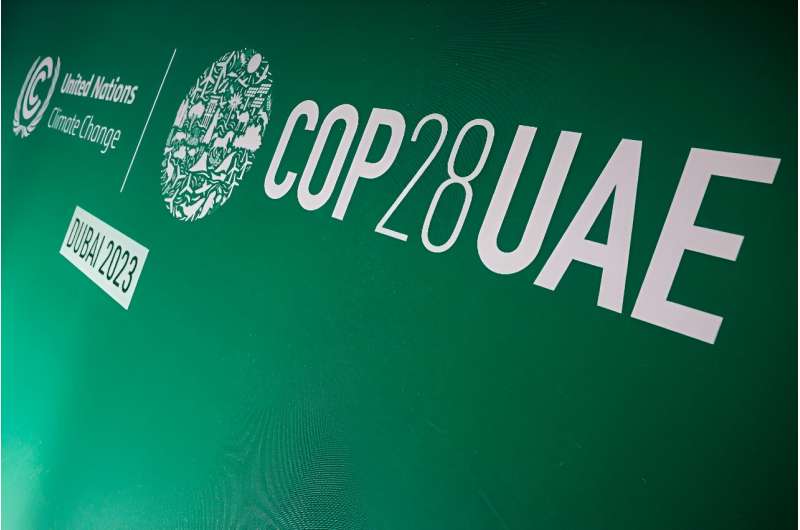This article has been reviewed according to Science X's editorial process and policies. Editors have highlighted the following attributes while ensuring the content's credibility:
fact-checked
reputable news agency
proofread
Five things to watch for at COP28 climate talks

Deadly floods in the Horn of Africa. Summer wildfires that ravaged Canadian forests. Global temperature records unprecedented in the history of humanity.
Environmental activists say there's no doubt anymore that urgent collective action is needed to preserve a livable planet. As the COP28 UN climate talks begin in Dubai on Thursday, here are five things to watch out for.
The energy transition
All eyes are on the language leaders will adopt regarding the transition from fossil fuels to renewable energy—crucial to limiting long-term warming to 1.5 degrees Celsius as envisaged under the Paris Agreement.
At COP26 in Glasgow, in 2021, countries agreed to a "phasedown" of "unabated coal power." Since then, momentum has been building among governments and activists to extend similar ideas to oil and gas, though the exact phrasing will have to be hammered out.
Expectations are high for voluntary pledges on tripling renewable energy capacity by 2030, a goal endorsed by the United States and China in a recent climate statement, as well as doubling the annual rate of energy efficiency improvements.
Ideally, the commitments should come in the form of an official response to the "Global Stocktake," a damning report card published in September that highlighted how little the world has done to confront the crisis.
Making 'loss and damage' a reality
A major breakthrough at COP27 in Sharm El-Sheikh, Egypt, was an agreement in principle to compensate climate-vulnerable countries that are least responsible for greenhouse gas emissions and facing multiplying severe weather impacts.
But operationalizing a new fund has proven complicated, with negotiations dragging on for over a year. Among questions that had to be answered: will all countries pay, or just the rich? Who will be the recipients? Where would the fund be housed?
A fragile agreement was reached in early November, and COP28 president Sultan Ahmed Al Jaber told AFP in a recent interview he hoped a decision would be adopted early on in the conference.
The climate financing gap
Expert groups believe the world needs in excess of $3 trillion in annual climate-related flows by the year 2030 to keep climate goals alive—but so far developing countries have fallen well short, both in terms of accelerating decarbonization, known as mitigation, and building resilience to climate impacts, known as adaptation.
In 2009, richer countries promised to reach $100 billion annually in funding for these priorities by 2020—a goal finally met last year, according to an OECD report earlier this month.
COP28 is expected to lay the groundwork for a new financing goal to succeed the old $100 billion target, though parties aren't required to reach a decision this year.
It could also provide an opportunity to better define and operationalize clause 2.1(c) of the Paris agreement, which called for "making finance flows consistent with a pathway towards low greenhouse gas (GHG) emissions and climate-resilient development."
Methane and food systems
Atmospheric methane is the second largest contributor to climate change, but has received relatively little attention compared to carbon dioxide, despite its potent warming impact.
China, the United States and the UAE are set to jointly hold a methane and non-CO2 greenhouse gasses summit at the talks, where there might be a strengthening of a 2021 "Global Methane Pledge" to reduce emissions by 30 percent by 2030.
COP28 will also be the first such conference to have a major focus on food systems, responsible for a third of manmade greenhouse gasses, with severe weather and droughts also in turn threatening food production and transport.
Another first: a summit featuring hundreds of "subnational" leaders such as mayors and governors.
Around 70 percent of the world's people are expected to call cities home by the year 2050, and increasing their participation in the climate fight is seen as vital, especially when national governments stall progress.
© 2023 AFP





















